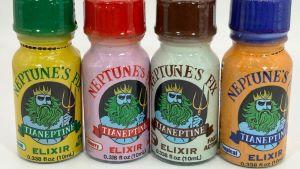If you are into TV shows and movies like Scarface, Miami Vice, Breaking Bad, and Weeds, we have a book for you.
A Miami cop had a habit of ripping off drug dealers, a Baltimore cop was trading pain pills and confidential information for cocaine, and more.
A limited therapeutic psilocybin bill has died in the California Assembly, the NCAA ends marijuana testing, and more.
A House subcommittee has moved to block marijuana rescheduling, a North Dakota marijuana legalization campaign faces an uphill battle in that reddest of red states, and more.
A Mississippi medical marijuana dispensary operators lawsuit over a state advertising ban gets thrown out of federal court, and more.
California could see dueling initiatives seeking to increase fentanyl penalties, the Biden administration announces a new initiative on drug treatment for inmates, and more.
One of the companies whose challenge to federal marijuana prohibition was thrown out this week vows to take it to the Supreme Court, and more.
North Carolina becomes the latest state to ban "gas station heroin," German conservatives vow to undo marijuana legalization if returned to power, and more.
Narco Media: Latinidad, Popular Culture, and America's War on Drugs by Jason Ruiz (2023, University of Texas Press, 248 pp., $29.95 PB)
This is not a book about the minutiae of drug policy. The author, Jason Ruiz, is an associate professor of American Studies at Notre Dame, and his field is not politics and policy but the realm of popular culture. In
Narco Media, he zeroes in on the portrayal of Latinos and Latin Americans in the fictional (sometimes fact-based) representations that have appeared on screens big and small, from
Scarface to
Better Call Saul and
Narcos.
In a fun and informative romp through these TV series and movies, Ruiz shows how, while many things have changed in popular culture representations of drug issues, at least one thing has remained stable: the portrayal of Latinos and Latin Americans as an alien force threatening the American body politic with dope. It seemed as if no episode of Miami Vice could be complete without a swarthy Latin villain, typically a drug lord wearing a white suit and with a penchant for homicidal violence.
Or in Breaking Bad, a critically lauded series about a white, middle-class teacher pushed by circumstance into meth production (who is portrayed sympathetically even as he transforms into the brutal drug kingpin Heisenberg), it is once again American Latinos and Mexicans who threaten our protagonists throughout. And Walter White/Heisenberg's competitor, "Chicken Man" Gus Fring, is Chilean.
Fring is also gay, a point made only very subtly in Breaking Bad, but one of interest to Ruiz, who, in a queer studies interlude examines the very limited portrayals of gayness in narco media. There is a recurring gay minor character in Miami Vice. Still, the more common response in the genre is to minimize it, as is the case with Colombian drug queen Griselda Blanco's lesbianism, which gets short shrift in Queen of the South, the USA Network series that ran from 2016 to 2021.
You can't talk about portrayals of the drug business in pop culture without talking about the most infamous drug kingpin of all, Pablo Escobar. He is, after all, the subject of the original Netflix series Narcos, Escobar: El Patron del Mal, Escobar: Paradise Lost, and Loving Pablo. Despite (or because of) his death at the hands of the Colombian state with the help of the gringos more than 30 years ago, the Colombian kingpin remains a source of cultural fascination. Ruiz calls him "the most alive dead man in the world."
Not only do the Escobar productions reproduce the stereotype of the violent Latin American drug lord, but they also typically follow storylines centered on white Americans. For instance, Narcos is narrated by characters based on real-life DEA agents. It seems to be an overarching feature of narco media that even though the subject matter is Latino or Latin American, whiteness is centered.
This book is a broad survey of narco media, touching on many more movies and TV series than I've managed to mention -- there are fascinating discussions of Weeds and Traffic, for instance -- but Ruiz returns time and again to his main point: Narco media reinforces narratives aimed at making white audiences comfortable, including comfortable with the drug war status quo, at least in part by making the Latino/Latin American Other the locus of the drug threat.
The serious messages notwithstanding, Narco Media is a gas to read, a fast-paced trip down memory lane with all those folks we love to hate and fear yet can't get enough of. Hello there, Tony Montana. How are you doing, Nancy Botwin? And Pablo -- how can we miss you if you won't go away?
back to top
A Miami cop had a habit of ripping off drug dealers, a Baltimore cop was trading pain pills and confidential information for cocaine, and more. Let's get to it:
In North Braddock, Pennsylvania,
a former Braddock police officer was arrested June 30 for allegedly peddling cocaine and providing privileged police information to a drug trafficker. Former officer Craig Gibson went down during an FBI investigation into drug trafficking in the area, which found that he was running cocaine for a dealer and providing the dealer with police information that could help him evade detection by law enforcement. Gibson is charged with felony corrupt organizations, delivery of cocaine, hindering prosecution, and other offenses. He was released on a non-monetary bond.
In Coldwater, Michigan, a Lakelands Correctional Facility guard was arrested Monday on drug charges. Guard Mark Everett Goodlock, 43, went down after the state Department of Corrections asked the State Police to investigate him. He was searched upon arrival at work and then arrested for felony drug possession. No further details are available.
In Boston, a former state prison guard was sentenced June 20 for trying to smuggle drugs into the Middleton House of Corrections. Former guard Gregorit Sanchez went down when he was searched upon arrival at work and found to be carrying a package containing 33 grams of fentanyl pills, one gram of crack cocaine, 14 grams of powder cocaine, and Suboxone sublingual films, as well as cigarettes and a SIM card for a contraband cellphone. He was subsequently charged along with 20 other people in a multi-state cocaine and fentanyl trafficking conspiracy and pleaded guilty to the charges. He got five years' probation, with the first year served on home detention.
In Baltimore, a former Baltimore police officer was sentenced Monday to 2 ½ years in federal prison on drug and firearms charges. Former officer Steven Umberto Angelini admitted in court to conspiring with a local drug dealer, providing him with prescription opioids in return for cocaine, and checking confidential police records for the dealer in the investigation into the killing of the drug dealer's supplier. Angelini admitted he turned a video related to the killing over to the dealer purely in exchange for cocaine. He pleaded guilty to conspiracy to distribute cocaine and oxycodone and possession of a firearm in furtherance of a drug trafficking crime.
In Miami, a former Miami police officer was sentenced Tuesday to more than 11 years in federal prison for using his law enforcement position to illegally stop drivers and steal what he thought were drug proceeds and 15 pounds of cocaine. Former officer Frenel Cenat, 41, went down after an informant told police Cenat had previously conducted traffic stops of individuals known to have engaged in drug transactions to steal the drugs and/or money those individuals were transporting. On Oct. 16, 2023, a friend introduced Cenat to the snitch at a meeting in Broward County, during which the three of them discussed an opportunity for Cenat to use his police officer position to stop an individual immediately following a drug transaction and steal approximately $50,000 in drug proceeds that the individual would have in their vehicle. Cenat indicated that he conducts the traffic stops outside of his jurisdiction and while off duty. On November 3, 2023, he watched two drivers in a Miami Gardens parking lot do what appeared to be a drug deal, stopped one of the drivers, and seized a backpack containing $49,000 in cash, letting the driver go. He did it again on November 16, 2023. But in both cases, the drivers were actually FBI agents, and after the second ripoff, agents arrested Cenat. He had $80,000 in cash and 15 pounds of fake cocaine, as well as $2,000 from the earlier ripoff.
back to top
A limited therapeutic psilocybin bill has died in the California Assembly, the NCAA ends marijuana testing, and more.

No more marijuana testing for Division I athletes, the NCAA has announced. (Pixabay)
House Rules Committee Blocks All Marijuana Amendments to Three Spending Bills from Getting Floor Votes. The GOP-led House Rules Committee, which determines which amendments get added to which spending bills, has rejected marijuana reform amendments in three separate spending bills -- for the Defense Department, the Department of Homeland Security, and the State Department, Foreign Operations, and Related Programs.
In all three bills, the committee blocked Rep. Robert Garcia's (D_CA) amendment to stop the covered agencies from testing job applicants in legal marijuana states.
The committee also killed an amendment to the defense spending bill from Rep. Nancy Mace (R-SC) that would have stopped service branches from expelling a servicemember merely for past nonviolent marijuana offenses. In that same bill, the committee also killed an amendment from Rep. Earl Blumenauer (D-OR) to allow veterans to access state medical marijuana programs. That amendment is based on Blumenauer's standalone Veterans Equal Access Act, which is already included in another appropriations bill.
Finally, the committee killed an amendment from Rep. Gabe Vasquez (D-NM) to block the use of Homeland Security funds for Customs and Border Patrol agents to seize marijuana from state-licensed businesses, as has occurred in his state in recent months.
Earlier this month, this same committee blocked all proposed marijuana amendments -- both pro- and anti-reform -- from the defense spending bill.
NCAA Removes Marijuana from Its Banned Substances List. The National Collegiate Athletic Association (NCAA) will no longer test Division I athletes for the presence of marijuana, the group announced Tuesday. The move came on a vote of its Division I Council, representing the nation's powerhouse athletic colleges and universities.
"The NCAA drug testing program is intended to focus on integrity of competition, and cannabis products do not provide a competitive advantage," said Council Chair Josh Whitman, athletic director at the University of Illinois. "The council's focus is on policies centered on student-athlete health and well-being rather than punishment for cannabis use."
The NCAA will also void any penalties currently being served by athletes who failed marijuana drug tests.
The NCAA only conducted random drug tests for marijuana products before championship events, such as Division I bowl games. However, the NCAA does not manage the College Football Playoff, which means drug testing policies will be up to the conference that runs it.
During the regular season, the NCAA generally only tests for performance-enhancing drugs. It can still test for those, as well as stimulants and narcotics before championships.
Psychedelics
California Therapeutic Psilocybin Bill Dies. Last year, a psychedelic legalization bill was vetoed by the governor. This year, a therapeutic psychedelics bill died in the legislature. And now, an even more limited bill that would have allowed veterans and retired first responders to use psilocybin under medical supervision, the Heal Our Heroes Act (Senate Bill 803), has died in the legislature.
Bill cosponsors Sens. John Becker (D-Menlo Park) and Brian Jones (R-San Diego) filed the bill after the broader therapeutic psychedelic was blocked in committee. But now, they have withdrawn the bill after it appeared headed for defeat.
"While the Heal Our Heroes Act will not advance in the Assembly Health Committee, it has raised awareness of the work-related trauma and troubling mental health issues our veterans and first responders face after honorably serving our state and country," Becker said. "More than 17 veterans die by suicide each week. This is unacceptable. Our heroes deserve the best care possible."
"The legislature has again failed veterans, first responders, and the 130,000 veteran families that have lost a loved one to suicide," said Jesse Gould, founder of Heroic Hearts Project, a nonprofit that works to further the acceptance of psychedelic therapies for veterans. "We applaud the legislators that supported SB 803 and its previous iterations, and are undeterred in our fight to find effective solutions to reduce veteran suicide and the veteran mental health crisis."
Assembly Health Committee Chair Mia Bonta (D-Oakland) vowed to return to the issue.
"It may well be that psychedelics have the potential to provide significant mental health benefits for those experiencing Post-Traumatic Stress Disorder. However, it is also crucial to provide a medical and therapeutic pathway with robust and meaningful regulation so California can be a beacon of leadership on this form of care," Bonta said in a prepared statement. "This issue will undoubtedly remain top of mind for me as I seek to ensure all Californians can access the safest and most effective care possible."
International
UN Annual Report Concedes Marijuana Legalization Shrinks Illicit Market, Notes Arrival of Psychedelic Renaissance. The UN Office on Drugs and Crime (UNODC) marked the occasion of World Drug Day (June 26) by issuing its annual report, World Drug Report 2024, and the report acknowledged some awkward facts for drug prohibitionists.
It acknowledged that marijuana legalization in the US and Canada has probably helped shrink the size of illicit drug markets and led to big drops in people being arrested for marijuana offenses. And it made note of the emergence of a "psychedelic renaissance."
"In some jurisdictions, the size of the illegal cannabis market appears to be shrinking," said a key finding of the report, "and in the United States the number and rate of people arrested for cannabis-related offenses [appears] to be decreasing."
Still, UNODC noted that racial disparities in pot arrests persist and voiced concern about new forms of marijuana products, such as vapes, high-THC concentrates, and infused edibles.
The report noted that as the year began, Canada, Uruguay, and 27 US states and territories had "enacted legal provisions allowing the production and sale of cannabis for non-medical use," while others, such as in Europe, "offer varying degrees of regulated access to cannabis for non-medical use."
The report also acknowledged "a renewed interest in the therapeutic use of different psychedelic substances -- controlled under the international drug conventions -- for the treatment of a range of mental health disorders has sparked a wave of clinical trials. Results from the early stages of ongoing medical research have led to policy changes that have allowed access to psychedelics for 'quasi-therapeutic' use in a couple of jurisdictions in the United States as well as for medical use in Australia and one jurisdiction in Canada," it said.
"Within the broader 'psychedelic renaissance', there are popular movements that are distinct from traditional use by Indigenous communities and are contributing to burgeoning commercial interest and to the creation of an enabling environment that encourages broad access to the unsupervised, 'quasi-therapeutic' and non-medical use of psychedelics," UNODC adds elsewhere in the report, noting that "the impulse to legalize psychedelics seems to be motivated more by the desire for unsupervised therapeutic use within the overall realm of mental health, mindfulness, spirituality, and overall well-being."
back to top
A House subcommittee has moved to block marijuana rescheduling, a North Dakota marijuana legalization campaign faces an uphill battle in that reddest of red states, and more.

Former Honduran President Juan Orlando Hernandez as he was being extradited to the US. Now he will be here for a long while. (Honduras National Police)
House Committee Uses Justice Funding Bill to Block Marijuana Rescheduling. The House Appropriations Commerce, Justice, Science, and Related Agencies Subcommittee voted Wednesday to include a provision barring the Justice Department from using its funds to reschedule or deschedule marijuana from the Controlled Substances Act. The bill keeps the existing rule that blocks the Justice Department from interfering in state-legal medical marijuana programs.
"None of the funds appropriated or otherwise made available by this Act may be used to reschedule marijuana… or to remove marijuana from the schedules established under section 202 of the Controlled Substances Act," the bill says.
While the bill keeps the existing rule telling Justice to keep out of state-legal medical marijuana, the subcommittee added a new provision that would allow the department to spend money to enforce violations of school zone laws. This is the first time any restrictions have been imposed on the medical marijuana rider since it was first enacted a decade ago.
All of these provisions in the Justice Department funding bill are subject to further negotiations.
Hawaii Governor Signs into Law Bill Launching Expungement Pilot Program. Gov. Josh Green (D) has signed into law a bill creating a limited pilot program to expunge marijuana possession arrest -- but not conviction -- records, House Bill 1595. A separate bill that would create a task force to draft broader expungement legislation is pending and appears poised to become law.
The pilot program is limited to Hawaii County, which is the Big Island. With 14 percent of the state population, it is the second most populous county in the state after Honolulu County.
Bill sponsor Rep. David Tarnas (D) drafted a bill that would automatically expunge all arrest and conviction records for small-time pot possession, but it was gutted in the Senate Judiciary Committee and replaced with the pilot program. That move was at the behest of Attorney General Anne Lopez (D), who said the issue was budgetary.
"There simply isn't the money available for new kinds of projects that aren't deemed necessary or crucial to the recovery" following massive wildfires that tore through Maui last August," said Dave Day, special assistant to the attorney general. "We felt that a pilot project to show how that would work, and potentially what resources would be required for a larger expungement program, would be appropriate."
Tarnas is okay with it, calling the amended measure "a good first step" toward a broader, statewide expungement plan.
North Dakota Poll Has Bad News for Marijuana Legalization Initiative Campaign. A poll commissioned by the Brighter Future Alliance, an independent political action committee, has grim tidings for New Approach North Dakota, the folks behind a marijuana legalization initiative still trying to qualify for the November ballot.
The poll has a solid majority -- 57 percent -- opposing legalization. The number is dispiriting but not surprising, given that voters in this reddest of red states have previously rejected freeing the weed at the polls.
The poll also had former President Trump leading President Biden by 34 points and Republican candidates for statewide office leading their Democratic opponents by similar margins.
Opiates and Opioids
Supreme Court Throws Out Oxycontin Settlement, Rejects Bankruptcy Protection for Sackler Family. A narrowly and unusually divided Supreme Court on Wednesday blew up a deal that would have provided billions of dollars to combat opiate use but would also have shielded members of the Sackler family, who owned Oxycontin maker PurduePharma, from paying out more in civil lawsuits.
Under the agreement hammered out by state and local governments and victims, the Sacklers would have paid $6 billion into the opiate fund and given up ownership of the company, but would still keep billions more dollars safe from any lawsuits.
But writing for a 5-4 majority, Justice Neal Gorsuch held that nothing in present law authorizes the Sackler discharge."
Joining Gorsuch in the majority were Justices Samuel Alito, Amy Comey Barrett, Ketanji Brown Jackson, and Clarence Thomas. Chief Justice John Roberts and Justices Brett Kavanaugh, Elena Kagan and Sonia Sotomayor dissented.
"Opioid victims and other future victims of mass torts will suffer greatly in the wake of today's unfortunate and destabilizing decision," Kavanaugh wrote.
The Sackler family suggested it will now return to negotiations.
"The unfortunate reality is that the alternative is costly and chaotic legal proceedings in courtrooms across the country," they said in a statement. "While we are confident that we would prevail in any future litigation given the profound misrepresentations about our families and the opioid crisis, we continue to believe that a swift negotiated agreement to provide billions of dollars for people and communities in need is the best way forward."
A lawyer representing more than 60,000 overdose victims said the decision was a major setback.
"The Purdue plan was a victim-centered plan that would provide billions of dollars to the states to be used exclusively to abate the opioid crisis and $750 million for victims of the crisis, so that they could begin to rebuild their lives," said attorney Edgar Neiger said in a statement. "As a result of the senseless three-year crusade by the government against the plan, thousands of people died of overdose, and today’s decision will lead to more needless overdose deaths."
But the father of one overdose victim praised the decision.
"This is a step toward justice. It was outrageous what they were trying to get away with," Philadelphia resident Ed Bisch said Thursday. "They have made a mockery of the justice system and then they tried to make a mockery of the bankruptcy system."
Law Enforcement
Honduras Ex-President Sentenced in US Court to 45 Years for Drug Trafficking. Former Honduran president Juan Orlando Hernandez, once a staunch US ally, was sentenced in federal court in New York City Wednesday to 45 years in prison and an $8 million fine for turning the country he ruled into a "narco-state" that funneled South American cocaine to the US.
He had been convicted on federal drug and weapons charges in March. US prosecutors said he took millions of dollars in bribes from Mexican drug trafficking organizations and helped move at least 400 tons of cocaine to the lucrative American market. He was also accused of protecting drug traffickers and blocking their extradition.
Prosecutors put the value of the cocaine at "well over $10 billion" and presented cooperating witnesses who linked the conspiracy to more than 130 murders.
"Juan Orlando Hernández abused his power as the president of Honduras to send incomprehensible amounts of cocaine to the United States," prosecutor Jacob Gutwillig said. "He was polluting this country with incomprehensible amounts of poison."
back to top
A Mississippi medical marijuana dispensary operators lawsuit over a state advertising ban gets thrown out of federal court, and more.

Someone tell Florida lawmakers it's only a movie.
Federal Judge Throws Out Lawsuit Over Mississippi Restrictions on Medical Marijuana Advertising. A federal judge in Jackson has dismissed a lawsuit from a medical marijuana dispensary owner who sued the state over regulations that prevent medical marijuana businesses from advertising in most media.
US District Court Judge Michael Mills ruled last week that because marijuana remains illegal under federal law, a medical marijuana business is not a "lawful entity" and thus does not enjoy the constitutional protections granted to most commercial speech.
The case was filed by Clarence Cocroft II, the owner of Tru Source Medical Cannabis in Olive Branch. He argued that the state's ban on advertising of medical marijuana businesses imperiled his ability to do business.
But undoing the restrictions would be a "drastic intrusion upon state sovereignty," Judge Mills held. "This is particularly true considering the fact that, by legalizing marijuana to any degree, the Mississippi Legislature has gone further than Congress itself has been willing to go," Mills wrote. "In light of this fact, on what basis would a federal court tell the Mississippi legislature that it was not entitled to dip its toe into the legalization of marijuana, but, instead, had to dive headfirst into it?"
After the verdict, Cocroft said he still maintained that the state's regulations violate the First Amendment and that he would appeal.
"I'm prepared to fight this fight for as long as it takes," Cocroft said. "This case is bigger than me and my dispensary -- it is about defending the right of everyone to truthfully advertise their legal business in the cannabis industry."
Drug Policy
Florida Governor Signs Bill Protecting State from Bears on Cocaine. Gov. Ron De Santis (R) has signed into law legislation popularly deemed the "bears on crack" bill, House Bill 87. The bill, which aims to protect residents from cocaine-fueled bears, provides a "stand your ground" defense for killing the animals.
The new law clarifies that a person is not subject to any civil or criminal penalties for killing a bear if he "reasonably believed that his or her action was necessary to avoid an imminent threat of death or serious injury to himself or herself or to another, an imminent threat of death or serious injury to a pet, or substantial damage to a dwelling…."
Although there are no known cases of cocaine-fueled bears attacking Florida residents, there was a movie released earlier this year that featured such a critter, "Cocaine Bear." That was apparently on the mind of bill sponsor Rep. Jason Shoaf (R-Port St. Joe).
"We're talking about the ones that are on crack, and they break your door down and they're standing in your living room growling and tearing your house apart," Shoaf said during a committee hearing on the bill."When you run into one of these crack bears, you should be able to shoot it, period. And you shouldn't have to pause or be afraid you're gonna get arrested or harassed or pay fines, that's just crazy."
In the movie "Cocaine Bear," which is based on a true story, a black bear got into duffel bags of cocaine thrown out of a smuggler's airplane over Tennessee in 1985. That bear died from a cocaine overdose, but there were no reports of it attacking anybody or terrorizing neighborhoods.
And now, Floridians can breathe a bit easier after the governor and legislature have neutralized this imaginary threat.
Drug Testing
California Bars, Nightclubs Must Now Provide Date Rape Drug Testing Kits. As of today, bars, nightclubs, and any other establishments that sell alcohol to be consumed onsite are required to provide drug testing kits to those who request them. The new law, formerly Assembly Bill 1310, allows consumers to request kits to test for "roofies" or Rohypnol, a sedative drug which is associated with attempted sexual assaults.
"It's security for those coming out to drink," said Brittany Halsell of Redwood City. "Sometimes you get carried away in a conversation and you turn your head and well, people are slick out here. You always have to be careful. It's a wonderful idea."
The test kits test for Rohypnol, ketamine, and GHB. While bars, nightclubs, and other establishments that just sell alcohol -- not food -- are required to provide the kits, they are not required to provide them for free.
"It's a great idea to protect the public and to give them a voice so they feel part of it," said Ja'vonn Williams, the assistant general manager of San Pedro Social. Williams said San Pedro Social will have bartenders and security offers give the cards to those who request them.
The state Department of Alcohol Beverages Control says the new law will effect some 2,400 licensed establishments across the state.
back to top
California could see dueling initiatives seeking to increase fentanyl penalties, the Biden administration announces a new initiative on drug treatment for inmates, and more.

Eradicating coca in Peru's Upper Huallaga River Valley (Peru Interior Ministry)
Marijuana Policy
Federal Court Throws Out Marijuana Companies' Challenge to Pot Prohibition. US District Court Judge Mark Mastroianni of the Western District of Massachusetts has dismissed a lawsuit from major marijuana companies that sought to block the Justice Department from enforcing marijuana prohibition against their activities in states where it is legal.
While Mastroianni found that there were "persuasive reasons for a reexamination" of current federal marijuana policy, he also found that Supreme Court precedent dictated that the federal government can regulate controlled substances even within legal state borders.
A number of companies, including Verano Holdings, Canna Provisions, and Wiseacre Farm brought the lawsuit. Still, Mastroianni found that "the relief sought is inconsistent with binding Supreme Court precedent and, therefore, beyond the authority of this court to grant." He added that the plaintiffs "do not provide a basis for this court to disregard the broad reading of the Commerce Clause."
Mastroianni noted that while he could offer no judicial relief, the plaintiffs "can pursue their claims and seek the attention of the Supreme Court," and they are also "free to advocate for marijuana to be reclassified or removed from the" Controlled Substances Act (CSA).
Drug Policy
California Democrats Seek to Blunt Prop 47 Rollback Initiative with Their Own Prop 47 Rollback Initiative. A decade ago, state voters approved Proposition 47, which reduced penalties for some drug and other criminal offenses. Now, with a Republican-backed Homelessness, Drug Addiction, and Retail Theft initiative to roll it back by making some drug possession and theft charges felonies already qualified for the November ballot, Democrats are stepping up with their own softer, gentler effort to roll back Prop 47.
Gov. Gavin Newsom (D) and Democratic lawmakers have filed Senate Bill 1381, which if approved by the legislature would then go before the voters as an initiative in November. That bill would crack down on retail theft and fentanyl sellers.
Shoplifters thrice convicted within three years could face up to three years behind bars, and people accused of theft could be charged based on the total value of multiple thefts over three years, which could shift charges from misdemeanors to felonies. On fentanyl, the measure would subject people who sell the drug without telling their customers it contains fentanyl to up to six years in prison and murder charges if someone they sold it to dies.
"This ballot measure is a critical step forward in our efforts to strengthen California's public safety laws and provide law enforcement with additional tools to address the growing concerns of property crime and the fentanyl crisis," Newsom said. "This balanced approach cracks down on crime and protects our communities."
"The subtext under this initiative is, 'I'm tough on crime, too, and even if I'm not quite as tough as those other guys, I'm also very smart about it,'" said Dan Schnur, a political science lecturer at UC Berkeley and former Republican strategist.
The Newsom-backed proposal received approval from the California Retailers Association, which has pushed to reform Prop 47. The group's president Rachel Michelin described the plan as "a smart solution that will protect our stores, employees and customers."
Newsom and Democratic legislators stand to gain political points if their initiative passes, said Menlo College political science professor Melissa Michelson.
"Now it's not the public leading it," Michelson said. "Now it's the governor and other elected officials who are on top of this issue."
Drug Treatment
White House Drug Policy Director Statement on New Action to Support Reentry and Addiction Treatment Access in Carceral Settings. White House Office of National Drug Control Policy (ONDCP) Director Dr. Rahul Gupta released a statement on new action from the Centers for Medicare and Medicaid Services (CMS) allowing five new states -- Illinois, Kentucky, Oregon, Utah, and Vermont -- to use federal Medicaid funds to address substance use disorder and facilitate improved continuity of care for incarcerated individuals. Part of the Biden Unity Agenda for the Nation, the bipartisan-supported policy was already in effect in California, Massachusetts, Montana, and Washington.
"Expanding access to life-saving treatment and recovery supports for incarcerated people is a critical part of our bipartisan efforts to beat the overdose epidemic and save lives," said Gupta. "President Biden made addressing the overdose epidemic part of his Unity Agenda for the Nation because it is an issue that affects every community across the country and requires members of both parties to deliver progress for the American people. Under this important action today, the Biden-Harris Administration is providing a groundbreaking opportunity for these states to increase access to health care, including care for substance use disorder, in jails and prisons, and provide historically underserved and marginalized individuals with the tools and resources they need to succeed upon reentry. I am grateful to these states -- red and blue, from coast to coast -- for joining our whole-of-society response to strengthen public health, enhance public safety, and save lives."
Other measures taken under the Unity Agenda include removing decades-long barriers to substance use disorder treatment and overdose reversal medication, expanding the number of healthcare providers who can prescribe opioid use disorder treatments by more than 1.8 million, and providing $83 billion into treatment, a 42% increase that done under the previous Administration.
Specifically, the administration's efforts to increase treatment access for people who are incarcerated, according to the statement, include:
- Allowing states to use Medicaid funds to provide health care services -- including treatment for people with substance use disorder -- to individuals in carceral settings;
- Providing professionals at correctional settings with a performance management framework to monitor medication treatment for opioid use disorder in correctional settings;
- Permitting State Opioid Response funds to be used for addiction treatment and services for people who are incarcerated;
- Calling for $4.1 billion to expand MOUD for treating individuals in BOP's custody with an opioid use disorder as part of the President’s FY25 budget request;
- Updating federal regulations for opioid treatment programs for the first time in more than two decades, including rule clarification allowing jails and prisons to treat patients for opioid use disorder (OUD) with methadone if they have another co-occurring disorder requiring treatment; and
- Calling for every jail and prison across the nation can provide treatment for substance use disorder.
International
Peru Announces More Coca Crop Eradication. The Ministry of the Interior announced Monday that a manual coca eradication campaign in the Upper Huallaga River Valley has destroyed 20,000 acres of crops since February.
The Special Project for the Control and Reduction of Illegal Crops in Alto Huallaga said eradicators hit more than 3,000 separate coca plots and that their efforts prevented the production of more than 70 metric tons of cocaine.
Conducted by members of the Peruvian National Police and the Anti-Drug Directorate (Dirandro), the raids also destroyed 12 coca processing laboratories.
The eradication campaign is part of the National Anti-Drug Policy, whose goal is to "relentlessly combat" drug trafficking and related crimes, the Ministry of the Interior said.
Coca has been grown by indigenous people in the Andes for thousands of years, and Peru has its own state coca monopoly, ENACO, to deal with legal coca products. But it has also been a leading cocaine producer for decades, currently ranking second only to Colombia.
back to top
One of the companies whose challenge to federal marijuana prohibition was thrown out this week vows to take it to the Supreme Court, and more.

The Delaware state capitol. Lawmakers there have approved a bill to expedite adult-use marijuana sales and promote social equity applicants. (Creative Commons)
Marijuana Company That Lost Challenge to Federal Pot Prohibition Vows to Take Case to Supreme Court. Verano Holdings Corporation, one of the marijuana companies that just had their case challenging federal marijuana prohibition thrown out of federal court, is vowing to fight that decision at the US Supreme Court.
In that case, US District Court Judge Mark Mastroianni of the Western District of Massachusetts dismissed a lawsuit from major marijuana companies that sought to block the Justice Department from enforcing marijuana prohibition against their activities in states where it is legal.
While Mastroianni found that there were "persuasive reasons for a reexamination" of current federal marijuana policy, he also found that Supreme Court precedent dictated that the federal government can regulate controlled substances even within legal state borders.
Several companies, including Verano Holdings, Canna Provisions, and Wiseacre Farm brought the lawsuit. Still, Mastroianni found that "the relief sought is inconsistent with binding Supreme Court precedent and, therefore, beyond the authority of this court to grant." He added that the plaintiffs "do not provide a basis for this court to disregard the broad reading of the Commerce Clause."
Mastroianni noted that while he could offer no judicial relief, the plaintiffs "can pursue their claims and seek the attention of the Supreme Court." They are also "free to advocate for marijuana to be reclassified or removed from the" Controlled Substances Act (CSA).
"We're taking this all the way to the Supreme Court!" wrote Darren Weiss, president of Verano, in response.
The Supreme Court ruled in 2005 in Gonzalez v. Raich that Congress has the authority to ban interstate trade in marijuana despite state laws allowing marijuana cultivation and sale. At the heart of the plaintiffs’ new argument is that, since the Gonzalez v. Raich ruling, nearly half of American states have legalized marijuana.
Delaware Legislature Approves Bill to Allow Medical Marijuana Dispensaries to Start Selling to All Adults. In a bid to speed up the emergence of a legal marijuana marketplace, lawmakers have approved a bill that would allow existing dispensaries to apply for "conversion" licenses to be able to sell in the adult-use market, House Bill 408. The bill also specifies that funds from licensing will go to support social equity applicants.
When lawmakers approved marijuana legalization last year, there was no path for medical marijuana dispensaries to move into the adult-use market. If Gov. John Carney (D) signs the bill into law, adult sales could begin by March or April of next year.
"They're already established here," said state marijuana commissioner Rob Coupe, who helped draft the bill. "They're good businesses that were established in Delaware based on our need. They've been contributing to our employment; they've been contributing to taxes; they're providing the service to the patients. So, it's good business for us to create a pathway for them."
The medical marijuana operators would have to be $100,000 for manufacturing, testing, and retail permits and $200,000 for cultivation permits to transit into the adult-use market. That is the money that will go to social equity applicants.
"House Bill 408 has potential to raise up to $4.2 million in licensing fees," Sen. Trey Paradee (D) explained during the debate. "That money will then be used to help launch and support the social equity licenses in the form of grants."
International
Mexican Officials Find 19 Bodies in Back of Truck in Chiapas; Victims of Battle Between Sinaloa Cartel and Guatemalan Gang. Mexican security officials discovered the bodies of 19 men wearing dark clothing and tactical vests and carrying firearms clips in the back of a truck near the town of La Concordia, just north of the Guatemalan border in the state of Chiapas.
The officials said the men were members of a Guatemalan criminal gang attempting to seize territory in the areas which ran up against a cell of the Sinaloa Cartel, which traffics cocaine and heroin from Guatemala into Mexico and which more recently has profited from trafficking migrants seeking to get to the US.
Guatemalan members of a criminal group fighting for territorial control in the area.
"It's a criminal group that wants to get into the area. They're Guatemalans, and this is where they're facing off against several (criminal) cells, in this case from Sinaloa," a Mexican security official said. "As a result of the increase in migrant trafficking in the area, the Sinaloa cartel, which previously controlled drug trafficking there, has become very strong," the Chiapas security source said.
Mexican President Andres Manuel Lopez Obrador referred to the incident as an "unfortunate confrontation" during his regular morning press conference Tuesday. Tens of thousands of Mexicans die in such confrontations between drug trafficking factions or with the state's repressive apparatus each year.
back to top
North Carolina becomes the latest state to ban "gas station heroin," German conservatives vow to undo marijuana legalization if returned to power, and more.
Marijuana Policy

Tianeptine AKA gas station heroin--now banned in North Carolina. (FDA)
. The
Amendment 3 marijuana legalization initiative from Smart & Safe Florida is cruising toward victory in November, a new poll finds. The poll from Florida Politics had the measure winning with more than 64 percent of the vote.
The initiative takes the form of a constitutional amendment, which requires a 60 percent majority to pass. That means that while the initiative is leading, the lead is not especially comfortable. Initiative campaigns typically want to be up at least 10 points in the months before Election Day to account for any slippage due to late opposition campaigns.
To that end, the campaign has just released a pair of radio ads to build support.
Other recent polls have been a mixed bag. An April poll had support at 56 percent among registered voters, but another April poll had support at only 47 percent. A May poll had support at 58 percent, and a June poll had support at 66 percent.
Medical Marijuana
Arkansas Medical Marijuana Amendment Campaign Hands in Signatures. Arkansans for Patient Access (APA), the group behind the Arkansas Medical Cannabis Amendment, has handed in 114,402 raw signatures to state officials. The campaign needs 90,704 valid voter signatures to qualify for the November ballot.
Voters in the state approved medical marijuana in 2016, but patients, especially those in rural areas, have complained about lack of access to their medicine. This initiative would ease access by allowing health practitioners -- not just doctors -- to recommend medical marijuana and by allowing recommendations via telemedicine.
"Our canvassers found voters eager to place an amendment on the ballot that will eliminate barriers to access and make it less expensive to acquire and keep a medical marijuana card," said Bill Paschall, APA campaign committee member. "As we move into the fall, we look forward to educating Arkansans all across the state about this amendment and the medicinal benefits of marijuana," Paschall said.
If passed, the amendment would also allow patients to grow their own plants at home and eliminate annual patient card renewals and fees.
Drug Policy
North Carolina House Approves "Gas Station Heroin" Ban. The House has unanimously passed a bill that would make the drug tianeptine, commonly referred to as "gas station heroin" because it is sold at gas stations and convenience stores, a controlled substance under the state's drug laws, House Bill 903.
Tianeptine is an antidepressant that is sold with a prescription in most European countries but is not scheduled in the US.
The FDA first began warning about the drug in 2018. It has been linked to overdose deaths as well as symptoms including a loss of consciousness, seizures, and other serious health problems.
"I first learned about the dangers of tianeptine from families in my district whose kids have become addicted to it," bill sponsor Rep. Erin Paré (R) said in a statement following the bill's passage. "This is an important bill to protect our kids from accessing this dangerous substance."
At least eight other states have moved to ban the drug.
While the House passed the bill unanimously, the Senate took no action on it during the short session that just finished. But it did pass House Bill 250, which contained similar ban provisions and has now been signed into law.
International
German Conservatives Vow to Revoke Marijuana Legalization If They Gain Power. The country's conservative opposition will rescind the freshly passed marijuana legalization law if it gains power in forthcoming elections, a senior spokesman said.
"In our view, drugs policy, particularly with respect to protecting young people, is an issue of such central significance that we will revoke the legalization of cannabis in the event we take power," said conservative parliamentarian Thorsten Frei. "In any possible coalition talks, [the rolling back of the legislation] will be a firm standpoint for us," added Frei, the parliamentary leader of the alliance of the Christian Democratic Union (CDU) and its Bavarian sister party, the Christian Social Union (CSU).
Legalization German-style allows for the possession in public of up to 25 grams for personal use and the possession of up to 50 grams at home. People can also grow up to three plants at home. There is no provision for a legal marijuana market, but people can also join co-ops to share in marijuana produced there.
back to top








